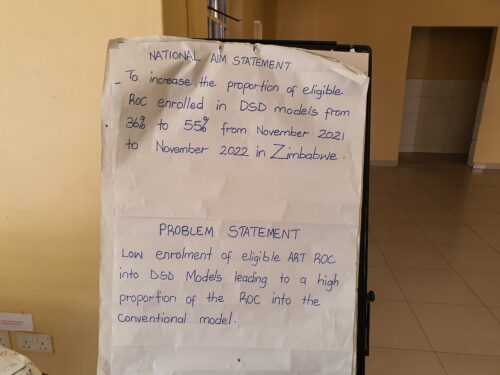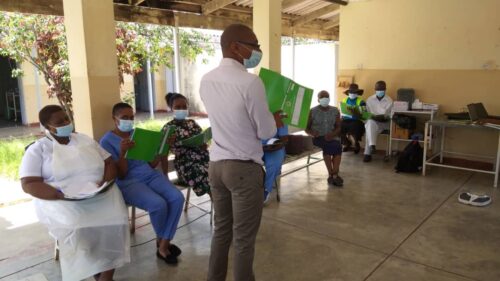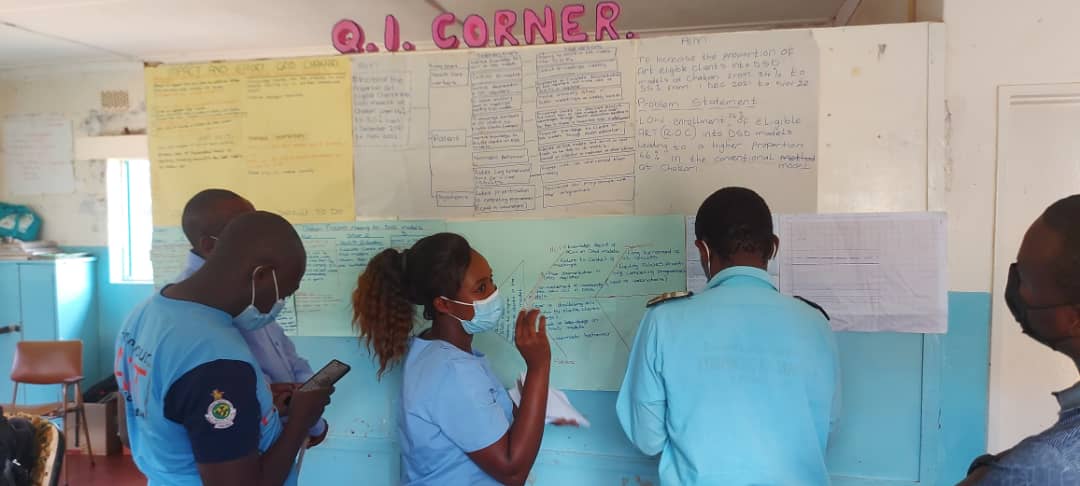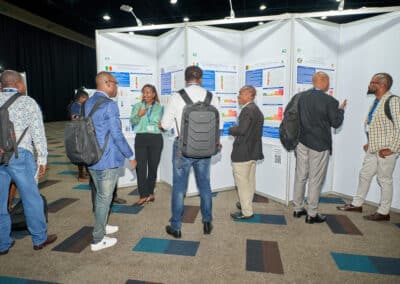Zimbabwe’s Ministry of Health and Child Care (MoHCC) has made significant progress in scaling up differentiated HIV treatment services for people living with HIV. Almost all health facilities providing antiretroviral therapy (ART) offer at least one differentiated ART (DART) model, and 36 percent of people on ART are enrolled in less-intensive DART models. Looking forward, the MoHCC has ambitious goals to expand DART even further. “Zimbabwe wants to increase the proportion of eligible recipients of care enrolled in less intensive differentiated service delivery (DSD) models from 36 to 55 percent by December 2022,” said Tsitsi Apollo, MD, deputy director for HIV/AIDS and STIs at the Zimbabwe MoHCC.
One part of Zimbabwe’s scale-up strategy is to improve the quality of DART services for recipients of care. Quality is an important domain on the CQUIN DSD treatment dashboard and the topic of all-network CQUIN meetings in 2019 and 2022. The goal is for each CQUIN member country to define DSD-specific quality standards, develop tailored indicators and assessment strategies, and use quality improvement (QI) methods when service quality does not meet national standards. The CQUIN Quality & Quality Improvement community of practice has co-created tools and resources to support these activities.
 In 2021, the Zimbabwe team, led by MoHCC, staged itself as “orange” in the quality domain, meaning that at least one evaluation of DSD program quality has been conducted using national quality standards, but the results do not indicate that country standards have been met. In response, they requested technical assistance from the ICAP CQUIN team to support two QI-for-DSD trainings in November 2021 and March 2022.
In 2021, the Zimbabwe team, led by MoHCC, staged itself as “orange” in the quality domain, meaning that at least one evaluation of DSD program quality has been conducted using national quality standards, but the results do not indicate that country standards have been met. In response, they requested technical assistance from the ICAP CQUIN team to support two QI-for-DSD trainings in November 2021 and March 2022.
Martin Msukwa, MPH, BSN, is a CQUIN regional advisor and leads CQUIN’s stream of work to support DSD quality. He worked with the Zimbabwe MoHCC to design the training, which leveraged a seven-part ICAP-developed QI training curriculum and included refreshers on QI methods, DSD implementation, and the specific challenges of using QI to improve the quality of DART services. Both training sessions were supported by CQUIN and included frontline health care providers, facilitators from the MoHCC and ICAP/CQUIN, and participants from PEPFAR implementing partners, including the Zimbabwe Technical Assistance, Training & Education Center (ZimTTECH) and the Organization for Public Health Interventions and Development (OPHID).
“We hope the CQUIN QI-for-DSD training will capacitate health facility staff with QI principles, theoretical knowledge, and practical skills to implement DSD models with fidelity using pre-defined DSD quality standards,” Dr. Apollo said.
Participants gave positive feedback on the usefulness of the training in a post-training evaluation report.
“For me, the training highlighted the correlation between reducing the workload of already burdened health workers and improving the quality of care given to clients. This knowledge will help me assist health workers in addressing issues that affect the enrollment of clients into DSD models,” said Gift Scholtz, a district program QI mentor who participated in the training.
“When providing ART services, we need to improve quality through DSD models that can decongest facilities and reduce waiting time for clients,” said another participant, Goba Rutendo, RN, a nurse.

CQUIN will provide ongoing technical assistance to support Zimbabwe’s plans for quarterly supportive supervision, focusing on using QI tools to implement QI projects, reviewing implementation progress, and providing technical input as necessary. “We need ICAP’s CQUIN team to support regular monitoring and mentorship visits to implementing facilities and in documenting best practices, successes, and challenges to inform program scale,” Dr. Apollo added. CQUIN will also work with the MOHCC and PEPFAR implementing partners to roll out the QI-for-DSD training to other provinces and facilities in Zimbabwe and other network countries as needed.
“When prioritizing which country to support with QI-for-DSD training, we look at multiple areas, including CQUIN treatment dashboard scores, in close consultation with partner countries,” said Mr. Msukwa. “We look forward to sharing the lessons learned from Zimbabwe throughout the CQUIN network.”






